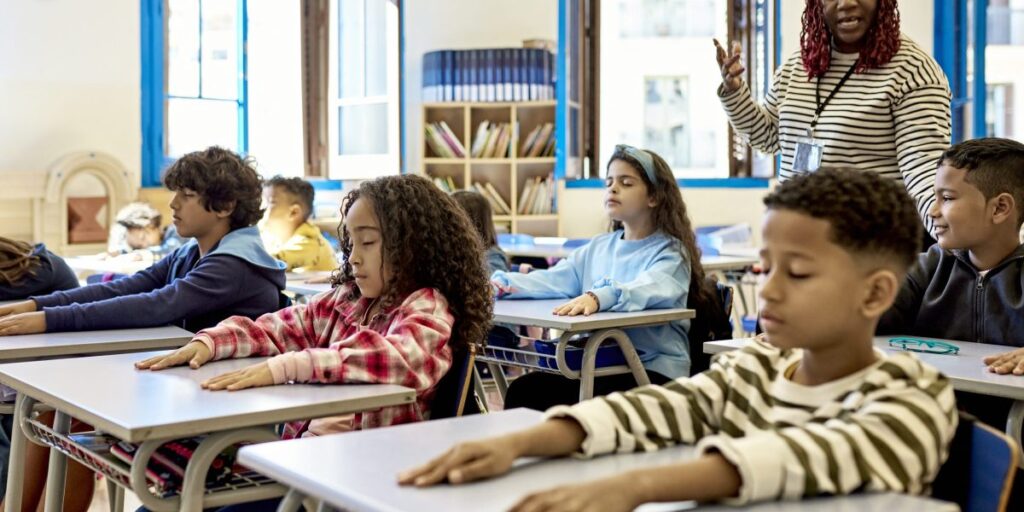
Third-grade students at Roberta T. Smith Elementary School were just days away from summer vacation and an hour away from lunch, but they didn’t have a hard time focusing as they filed into the classroom. They are ready for one of their favorite parts of the day.
The children closed their eyes and ran their thumbs from forehead to heart as pre-recorded voices guided them through an exercise called “Shark’s Fin” as part of the classroom’s regular meditation routine.
“Listen to the bells,” teacher Kim Franklin said. “Remember to breathe.”
Schools across the United States have been introducing yoga, meditation and mindfulness practices to help students manage stress and emotions. The Centers for Disease Control and Prevention last year supported schools using these practices as it became increasingly clear that students were struggling with mental health issues in the wake of the COVID-19 pandemic.
Research finds that school-based mindfulness programs can help, especially in low-income communities where students face high levels of stress or trauma.
The mindfulness program reaches Smith Elementary School through a contract with the school system Clayton County Public Schools, where two-thirds of students are black.
Atlanta Greenlight Fund, a network that connects the community with local nonprofits, helps Georgia school systems pay for mindfulness programs offered by audio platform Inner Explorer.
Joli Cooper, executive director of Atlanta Greenlight Fund, said it was important for the organization to support an organization that is accessible and relevant to communities of color in the greater Atlanta area.
Children across the country are struggling with the effects of isolation and distance learning as they return from pandemic school closures. The CDC reported in 2023 that more than one-third of students are affected by persistent feelings of sadness and hopelessness. The agency recommends that schools use mindfulness practices to help students manage their emotions.
“We know the mental health of our teens and tweens is really strained,” CDC Director Dr. Mandy Cohen told The Associated Press. “We can teach teenagers some real skills to make sure they can cope with some big emotions.”
The mindfulness approach represents a form of social-emotional learning that has become a political flashpoint for many conservatives, who say schools use it to promote progressive ideas about race, gender and sexuality.
But supporters say the plan brings much-needed attention to students’ well-being.
“Unfortunately, when you look at the numbers, the number of children of color who have suicidal thoughts and succeed is quite high in Georgia,” Cooper said. “When you look at the number of psychologists available to these children When it comes to numbers, you find there aren’t enough psychologists of color.”
According to statistics from the Centers for Disease Control and Prevention, black teen suicide rates are growing fastest among racial groups. Between 2007 and 2020, the suicide rate among Black children and adolescents aged 10 to 17 increased by 144%.
“It’s a shame to be able to say you’re not well and need help and have the ability to ask for help,” said Tolana Griggs, assistant principal at Smith Elementary School. “Our school community is diverse and wants to learn more about our students, how different cultures feel and how different cultures react to things, so it’s important that everything we do is inclusive.”
Nationwide, children in schools that primarily serve students of color have less access to psychologists and counselors than children in schools that serve primarily white students.
The Inner Explorer program guides students and teachers through five- to 10-minute breathing, meditation, and reflection sessions several times a day. The program is also used by Atlanta Public Schools and more than 100 other districts across the country.
Teachers and administrators say they’ve noticed changes in their students since incorporating mindfulness into their daily routines. For 9-year-old Aniyah Woods, the program helped her “calm down” and “no longer stress.”
“I love who I am, but Inner Seeker makes me feel more like myself,” Aniyah said.
Malachi Smith, 9, practices at home, where his father helps guide him through meditation.
“You can use shark fins to relax yourself, and when I calmed down, I realized I was a good scholar,” Malachi said.
After Franklin’s class completed their meditation, they shared their feelings.
“Relax,” one student said.
Anya raised her hand.
“It makes me feel calm,” she said.

